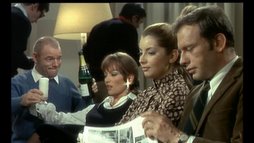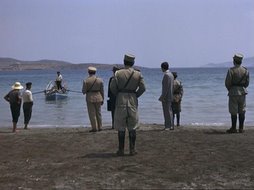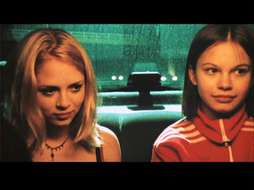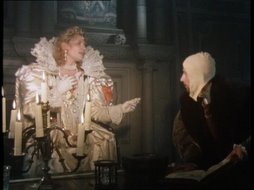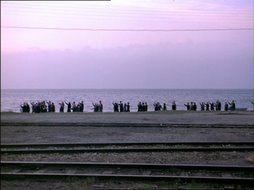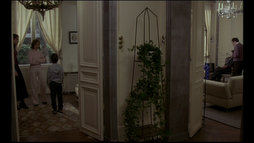
Is this the rope by which Hitchcock hangs himself? For me, yes, well - at least in part. The obsession with style and technique here really overrides the plots focus and any sense of realism. The rope may be awaiting the film's protagonists, it may be the ingredient that gave them away, but in trying for so long to tie the long tracking shots together Hitch' comes desperately unstuck for this particular viewer.

The set-up is simple: 2 impossibly arrogant bourgois students murder a classmate purely to see if they can get away with "the perfect murder". Murder, they proffer, is not just a crime but an art form reserved for the higher classes of individual to be perpetrated on the weak lower echelons of society. After the murder the 2 students hold a party attended by the deceased's girlfriend, his father and aunt, another friend and an old teacher. To add excitement, or for whatever reason, they use the trunk into which they've dumped the body, for the party's centrepiece. The film follows the conversations at the party and the unravelling of their big plan by the teacher.

There seems to be so, so much wrong with this film. For starters there's the way it's shot. After the first cut to the interior Hitchcock does so much to mask the cuts [at the end of reels] by using close-ups of characters' backs to mask the edit. At the time, i can see that this would have worked for the majority of the audience who wont be looking for edits, but years later with a reputation firmly established this bold experiment fails in my estimations. Once we, the audience, are aware of what Hitchcock is doing, every edit becomes more than just obvious - they become the focus of the film. The close-ups on backs are unsightly, drawing unwarranted attention to themselves they reveal the director's trickery drawing further focus away from the story itself. Perhaps however, this can be excused in context, when technology of the time is taken into account as well as the audience etc. What's stranger then, is when in the final section of the film the cutting resorts to much more standard practise. As unsightly as the early edits may be, they do at least establish their own form of rhythm with which one can accept and become attuned to, but this is all undone by the end of the film. For a film "with no cuts" 3 or 4 actual cuts seems quite steep, for all the good these later cuts do he [the director] may as well have put in a jump cut at the end to a courtroom or to the gallows. I can't deny the technical achievements in pulling those huge camera through the set to achieve those eternal tracking and panning shots, but i really don't feel here that the risk was worth it. In technical innovation Hitchcock undermines any semblance of realism the film started off with, to the point that it's less of a film per se, but an unpolished, raw technical experiment that still needs an awful lot of work before it's fit to be shown to audiences.

Assuming however, you can buy the style and technique enough to focus on the story, how good is the plot? Again, it's found wanting. Wanting of a twist, something interesting to spice it up, something to raise this overwrought melodrama from the ever-predictable doldrums in which it irrevocably resides. For two students who seem so apparently well-educated one has to question almost every decision they make in the film. By placing the body, literally, in the middle of the party they are displaying a huge degree of arrogance and egotism. We know it's going to be their downfall, so maybe that's the point - that ego leads to failure, that the obnoxious upper classes are never as superior as they think they are intellectually or otherwise. But most people already are well aware that arrogance is a forbearer of doom; cocksure and distasteful we resent these protagonists as soon as we meet them and hope they get what's coming to them... which, essentially is what happens in the film. The guests turn up, the teacher rumbles their scheme and makes sure the police come to arrest them. To me it seems bafflingly simple, and almost pointless. Person does bad, gets found out and receives comeuppance: where's the fun, interest, intrigue; excitement in this? Fans seem to point to tension, but i can't say i felt any, at any point in the film. The whole thing seems to be one slippery slope from the moment Stewart enters the room, from the moment he steps in he seems suspicious and gets ever more so 'til the climax. There's no discernible revelation here, just mounting evidence that increasingly confirms one characters initial fear/suspicion. Again however, this in itself is not always a terrible thing - after all films that tell a simple story well in a tight runtime can be just as much the masterpiece as those sprawling epics which interweave many complex narrative threads and characters. But, all i can say here is that the execution is terrible (pun intended). There's a kind of build-up to a debate over the merit of murder's artistry in which the protagonists all but give themselves away (they really couldn't make it more obvious, throughout the film, that they are very guilty murderers), yet this central debate, the apparent focus of the film is over extremely quickly with only superficial argument. There's a sort of revelation near the end when the teacher rescinds his standpoint on murder as art, an act (rescission that is) that could have come as a surprise if we knew more of his character or if he didn't seem so impossibly, eloquently, liberal - that he would see the error in his previous views comes as no shock whatsoever; indeed the only shock is that it takes him so long to do so. All in all, the story seems barely real or credible, with lines feeling evermore contrived and dialogue evermore focused on driving home plot points being delivered by 2 dimensional characters none of which we can reasonably side with.

All that remains then is the performances, which could make the film worthwhile. They don't. Wooden throughout, stagey delivery and extraordinary unevenness leave the performances - even from the leads - approaching a shamble. The last remnants of reality are shattered every time anyone speaks a line. The actors should be on a stage when they talk like this, not a film set, and when i say talk i mean read. I'm fairly sure that there are times you can see the actor reading his/her lines off of a cue card off-screen. Monotony is one thing, but that actually, isn't the problem here - everything else is. There's a total emotional dearth at the script's core, and with emotion absent what we're left with is these cardboard figures blandly reading a poorly constructed argument on the morality and sociology of crime. I wanted there to be another layer, some kind of subtext, maybe even something metaphorical going on but there just isn't. At times the writing borders on incompetent - especially with the girl and her ex-boyfriend: really i see no point whatsoever in them being at the party, their only contribution to the plot is needless time-wasting. I don't hate the performances, because i think the fault lies as much with the writers as the cast but surely good actors can make a bad script work - even to some small extent? Perhaps not. James Stewart, FWIW, is the most bearable of those appearing the feature, although that's only because he's playing James Stewart who i happen to like; if Tom Hanks was in the role i would undoubtedly have hated him.

All in all, i was left thoroughly disappointed by a film that seemed to hold so much promise and didn't deliver, at all.












